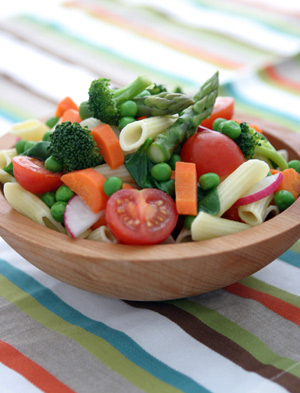Written By: Julie Riggs Med. RD LD
Thinking About Going Organic?If you are thinking about buying organic foods, you may want to read my article first. Many people are choosing organic for their family’s health, but you may be buying more expensive foods in vain. Don’t get me wrong, organic foods are much better for the environment, since there are stricter rules for production, handling, and processing; but as for the health benefits, for the most part, they are no safer or more nutritious than conventionally produced foods.
For example, beef, poultry, eggs, and milk that are produced organically live under less-crowded conditions, which might reduce animal-to-animal transmission of disease-causing bacteria. But, on the other hand, there is not evidence that they are exposed to any less chemical contaminants or antibiotic residues than their non-organic counterparts. PCBs and dioxins are spread through the air and water, so there’s no reason to think they are less likely to settle on an organic farm than on a conventional one. Even worse, organic farms are equally as vulnerable since insects, birds, and other animals are also easy routes for invasion by pathogens.
What does this all mean?Well, let’s define organic according to the US Department of Agriculture. “Organic food is produced by farmers who emphasize the use of renewable resources and the conservation of soil and water to enhance environmental quality for future generations. Organic meat, poultry, eggs and dairy products come from animals that are given no antibiotics or growth hormones. Organic food is produced without using most conventional pesticides; fertilizers make with synthetic ingredients or sewage sludge; bioengineering; or ionizing radiation. Before a product can be labeled “organic,” a Government-approved certifier inspects the farm where the food is grown to make sure the farmer is following all the rules necessary to meet USDA organic standards. Companies that handle or process organic food before it gets to your local supermarket or restaurant must be certified , too.” www.ams.USDA.gov/nop
So, if you are thinking about going organic, but don’t believe the hype completely, you may want to choose a few fruits or veggies that DO have proven higher pesticide residues. You can lower your pesticide exposure by up to 90% just by avoiding the worst offenders below. Here’s a list from best to worst for your next trip to the supermarket:
WORST OFFENDERSPeaches

Nectarines
Apples
Sweet Bell Peppers
Celery
PearsStrawberries
Spinach
Lettuce
Potatoes
Grapes (imported)
Cherries
MAY NEED SOME WASHINGCarrots
Green Beans
Grapes
Hot peppers
Cucumbers
Plums
Raspberries
Blueberries
Tomatoes
Cantaloupe
Mushrooms
Oranges
Sweet Potatoes
Watermelon
Cauliflower
CLEAN AS A WHISTLEPapaya
Broccoli
Cabbage
Bananas
Kiwi
Avocado
Sweet peas (frozen)
Asparagus
Mango
Pineapples
Sweet corn (frozen)
Onions
In conclusion, I am all for using renewable resources and conserving water and soil. I am also all for (even slightly) more humane treatment of animals and the use of less steroids and antibiotics. I must admit, I was buying organic milk and chicken because I actually thought both were free of this stuff. Reality is, there isn’t much of a difference in the actual food itself. So, do your shopping as you wish, wash your fruits and veggies well (organic or not), and whatever you do, YOU’RE BETTER OFF EATING FRUITS AND VEGGIES WITH PESTICIDES THAN NOT EATING THEM AT ALL!! Happy shopping.
People who read this article have used these products:Miracle GreensMiracle Reds7 Day Cleansing Detox Julie Riggs Med. RD LD
Julie Riggs Med. RD LD
Registered and Licensed Dieticianwww.i-supplements.com
Julie Riggs has been teaching fitness and nutrition skills to every population, from NFL players to the elderly, pre and post-natal moms to professional bodybuilders for her entire career. As a writer and consultant for www.i-supplements.com and as a registered dietician, personal trainer, and mom of three Julie brings real life perspective to the every day person's fitness and nutritional concerns.